Word on the street II: Graffiti
Saturday, April 16, 2005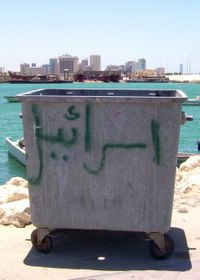
Continuing on from my recent post "Word on the Street", I thought I'd write a bit more about public expression, this time focusing on graffiti in Bahrain. From my observations, the graffiti can be grouped in to three general categories: (i) domestic politics, (ii) international politics, and (iii) religious.
Domestic politics
From my observations and memory, there wasn't any significant graffiti activity until the civil unrest starting in 1994 (older readers, please correct me if I'm wrong). This constituted the first of the three categories stated above: domestic politics. Typical phrases that were spray painted (usually in Arabic, but sometimes in English) were "We want a parliament", "we want the 1973 constitution" and "down with Al-Khalifa". Below is an example. It's hard to read because someone has already made an attempt to cover it up, but it says "We want freedom" in both Arabic and English:
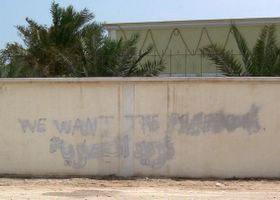
It was also quite common to see spray-painted stencil portraits of (the then) opposition leader Shaikh al-Jamri, or of some of the people killed by the state security forces during the uprising. At the height of the unrest, graffiti was popping up everywhere daily. And if it was in a very public place, near a main highway for example, the government usually had it painted over immediately, leaving these huge white rectangles all over the place. New graffiti of this sort stopped emerging when the unrest ended, after Hamad became Amir (later renamed to "King") in 1999. Most of this graffiti has by now been painted over.
International politics
Graffiti reflecting international politics did not emerge until the second Palestinian intifada in 2000. Aside from Pro-Palestinian phrases such as "Jersualem is ours", the intifada unleashed a wave of anti-American and anti-Israeli feelings. The two photos show graffiti saying "Death to Israel":

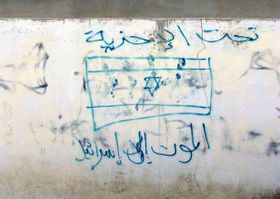
The two photos below show graffiti written on public rubbish bins. The first one has "Israel" written on it, and the second one has "The White House" on it.


These feelings further intensified after Mohammed Juma, a Bahraini protestor, was killed during a protest outside the US Embassy that turned violent back in April 2002. Thereafter, Juma was depicted as "Bahrain's martyr for Palestine", and spray-paint stencil portraits of him popped up everywhere. The portraits are still around, especially at bus stops for some reason.
George Bush's war on terror also generated a significant amount of anger, but I never saw it translated in to support for Osama bin Laden... except for this one exception I found in Muharraq (the two photos show the same wall):
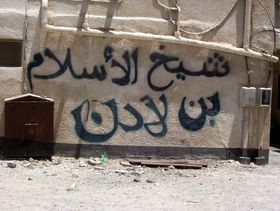
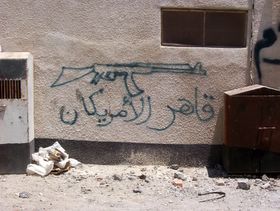
In the first photo it says "Osama bin Laden, the leader of Islam". In the second photo (which was right next to the first) it says "Conqueror of the Americans". This is the only such graffiti I've seen in Bahrain. Has anyone else seen anything similar elsewhere on the island?
Religious
Religious graffiti in Bahrain is usually in the form of "O Allah", or "O Hussain", or something similar:
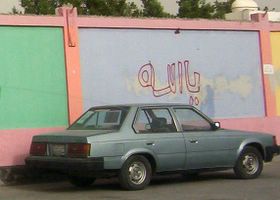
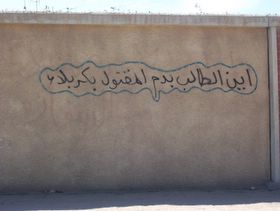
I'm not really too sure what might drive someone to get a can of spray paint and write something like this on a wall. It seems to lack the urgency that might motivate one to write something about a precise political issue. But what is interesting is the use of religious phrases to convey a political issue. Phrases such as "Enough of humiliation" and "Death with honor is better than life in subservience" are usually associated with the events of Karbala and Ashura. But spray-painted on walls, these phrases take on a very political meaning, especially during the civil unrest of 90s.
So what?
I think it is very significant that there has been very little graffiti activity over the past two or three years. It says alot. One would expect people to resort to graffiti only when there is no other outlet for public expression, as was the case in Bahrain a few years ago. Today, the local Press has a bit more freedom than it did before. Political protests and conferences take place very frequently, whereas they were not tolerated whatsoever before. And the arrival of the Internet has made a huge difference with the emergence of online forums and blogs, allowing cheap, fast, and (almost) unregulated communication with people in Bahrain and around the world.
Yes, the government has in several recent cases attempted to intimidate people in to keeping quiet (the Al-Khawaja affair, the BahrainOnline arrests, the Sitra protest), so there is yet a ways to go. But the situation today is drastically different from just a few years ago when the regime had a complete stranglehold on the flow of information in Bahrain. Just a few years ago I would not have dared to set up a blog like this, out of concern for the safety of myself and loved ones. Just a few years ago, a peaceful protest demanding the resignation of the Prime Minister would have been met with tear gas and rubber bullets.
This relative freedom of speech is, in my opinion, the only change brought about by King Hamad's reforms that is real and significant. The parliament has so far been fruitless, the government is still run by a single family, and the courts are still not independent. But as long as this current environment of (relatively) free speech is maintained the rest of the reforms will inevitably come, sooner or later. So be worried if you see lots of new graffiti on the walls.


4/16/2005 10:15:00 pm
Hmm.. I think the correlation you're trying to draw between decreasing graffiti and increasing freedom of press makes sense... but I also think that attributing the slightly expanded freedoms to King Hamad's "reforms" is problematic. Could it possibly have to do with the increasing impossibility of turning a blind eye to global networks of communication? I mean, on the one hand, the family claims to seek economic liberalization, further modernization and loves accolading itself each time the gap between Bahrain's level of technological advancement with other countries decreases. On the other hand, they're trying to maintain the status quo of zero freedom of speech and criticism of the govt. I think the transformation in communication everywhere is the force behind the change in Bahrain. Knowing the ability to connect with people globally, makes people less fearful locally especially if the forms of communication are so different. The former will always press on the latter.
More importantly, the illusive rhetoric of "democratic reform" in Bahrain forces the govt. to be a little less restrictive. If you look closely, it might seem as if people can say more of what they want in the papers, but the dialogue so far has been petty and trivial at best consisting more of people being allowed to say the most racist, sexist things to each other as the Letters section of the GDN will demonstrate.
The more important forms of expression such as peaceful protest are still sharply condemned... and we're certainly not at the stage where one can discuss Bahrain with analytical rigour in the open. What those discussions would reveal are simply too frightening for the ruling class.